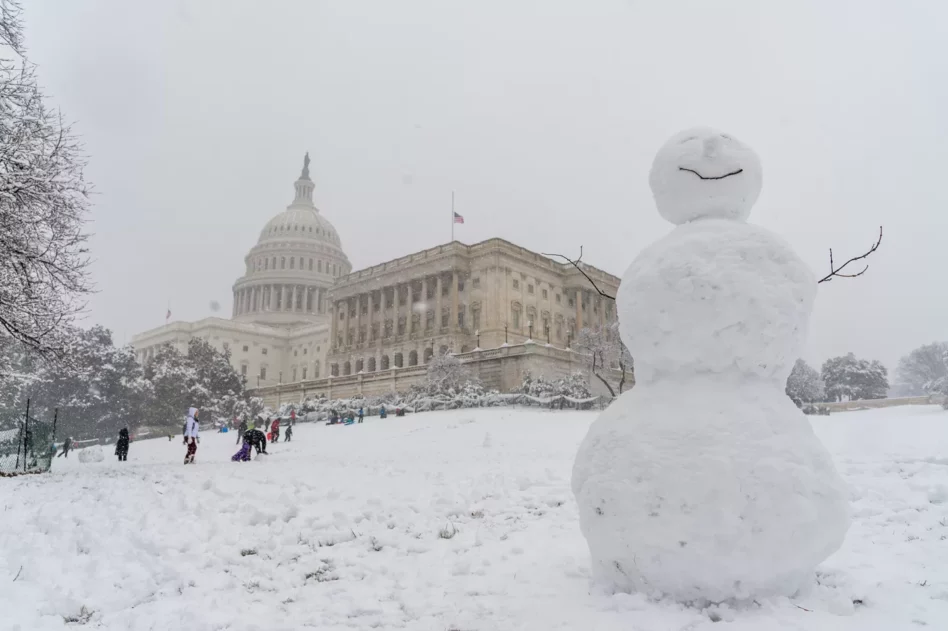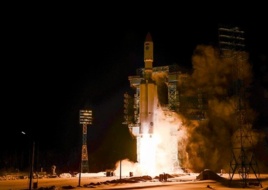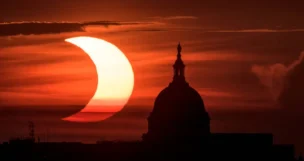New leaders in DC and a booming space economy are likely to make 2025 an important one for space policy discussions on topics ranging from NASA’s long-term goals to federal funding levels to buying commercial to regulatory processes.
Here are four big-picture things that we’re watching to drive space policy discussions in 2025:
Changing of the guard: The top thing we’re watching this year is how the incoming Trump administration—and his pick to lead NASA, SpaceX astronaut Jared Isaacman—puts their mark on space policy. Some big questions remain, including:
- The future of the SLS rocket
- Whether Trump will continue the National Space Council
- How Elon Musk’s relationship with Trump will influence his space policy views
We’re poised to have leaders in multiple high ranking positions who are commercial space advocates and are expected to make space a top priority. Trump’s first administration was very engaged in space, and—while we’re still waiting to learn who will serve in important positions such as the leadership of the Office of Space Commerce and the potential National Space Council—industry is widely expecting Trump’s second term to follow the same pattern.
People matter: A Republican-controlled Congress, where key committees are led by space advocates, could also make an impact. Sen. Ted Cruz (R-TX), a former head of the space subcommittee who most recently served as ranking member of the Commerce, Science, and Transportation Committee, will be chair of the panel now that control of the Senate has flipped.
On the House side, with Rep. Frank Lucas (R-OK) term-limited on the Science, Space, and Technology Committee, Rep. Brian Babin (R-TX) will chair the panel. Babin previously served as the top GOP rep on the space subcommittee and has a deep interest in human spaceflight, having represented Johnson Space Center for a decade.
As you can tell by their names, both committees oversee a huge swath of federal activities, so having leaders who prioritize space is critical.
Reauthorization: Passing a new NASA Reauthorization Bill has also been a top priority for both Babin and Cruz, so their leadership positions could give fresh life to the years-long effort. Cruz was one of six lawmakers to back the NASA Transition Authorization Act of 2024, which was introduced in late December.
The bill would authorize $25.5B for the space agency in fiscal 2025, a $93M increase from the administration’s budget request. It would also authorize other space agency priorities, including:
- Developing and building at least two lunar landers
- Maintaining a continuous human presence in LEO
- Continuing the CLPS program to deliver payloads to the Moon
Lawmakers did not act on the piece of legislation before the 119th Congress began last week, at which point the legislative slates were wiped clean. But the eleventh-hour introduction suggests there’s a bipartisan appetite to address this, and it’s likely not the last we’ll see of this legislation.
Dollars and sense: There’s likely to be more debate about NASA’s top line for fiscal 2025, as some lawmakers are lobbying for even higher spending on space, including investing in the agency’s space science program. Nearly two dozen lawmakers sent a letter to appropriators in December asking for a $26.8B NASA budget, including at least $7.88B for the science mission directorate.
“While the United States faces these budgetary shortfalls, other nations are rapidly increasing their investments in space science,” the letter reads.”China, India, and Europe have increased their space budgets by up to 10% annually, aggressively advancing their space exploration agendas. If the U.S. does not act, we risk losing our competitive edge in space technology and exploration.”




